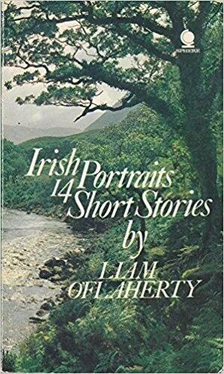Presently Mr. Mullally hung up a notice on a piece of cardboard outside his shop. On it was written in scrawling letters: “Mackerel for Sale. A Penny each. Fine fresh Mackerel.”
Women came rushing from all sides towards the shop to buy the mackerel. The town came to life in an extraordinary fashion. People were running in all directions. The demand was so great that after ten minutes Mr. Mullally came out and changed “A Penny” to “Tuppence.” After twenty minutes, when there were only twenty mackerel left, he came out and changed “Tuppence” to “Three Pence.” The townspeople began to grumble, but such was the demand for the fish that they paid three pence each for them.
All this time Bartly Tight roamed about his own yard cursing violently. But at last his desire for fresh mackerel got the better of his principles, and he sent his young son down to the shop to buy six mackerel. The little boy got the last six of the fish.
The whole town was frying mackerel. A delicious odour permeated the silent air. Not a soul moved about. Everything was perfectly still. Mr. Mullally was again sitting in his doorway, cutting cheese sandwiches for himself with a large clasp knife. That was his lunch. He was smiling. He had bought the mackerel for two shillings, and he had sold them for nineteen shillings and three pence.
Half an hour passed. Then a stream of sated men strolled into the square once more, their faces red, their stomachs thrust out. They had dined deliciously. They sank wearily to the base of the monument. The same lean man with a black wart on his face sat on the edge of the horse trough and allowed the tail of his ragged coat to become immersed in the water once more. Even Bartly Tight appeared, tamed somewhat by his healthy meal. He also sat down. Nobody spoke. Some closed their eyes and fell asleep. Not a sound was heard, except an occasional grunt and an occasional snore. Mr. Mullally had finished his cheese sandwiches, and he was wearily reading the piece of newspaper in which he had held them.
Then suddenly an extraordinary noise was heard. It came from within Mr. Mullally’s public-house. It was almost an inhuman sound, a loud, piercing yell. Strangely enough the crowd of idlers round the monument took very little interest in it. They just glanced towards the shop and smiled. Mr. Mullally himself struggled to his feet and entered his shop, rather hurriedly but not very hurriedly.
“Now ye divil ye,” said a man who was stretched at the base of the monument, “ye’ll see some fun or I’m a liar.”
“Ah!” growled Bartly Tight, staring into the white, still sea, savagely, “is there such a thing as pity or are the cannibals right after all? Eh? Are we all cannibals only we don’t…”
“Ug-ug-g-g… r.r.r.r…. ya-ah-ah.”
The piercing yell came again and the body of Tameen Maloney was hurled into the yard of Mr. Mullally’s public-house. Tameen fell on the yard and writhed there. Mr. Mullally appeared at his door, rubbing one palm against the other.
“He’s got em again, the devil,” laughed a man near the monument.
Bartly Tight shuddered, and got to his feet. He spat.
“Blast it,” he said. “I can’t stick this.”
He strode down towards the shore, savagely swinging his arms. It was very hot and still.
Tameen Maloney suddenly jumped to his feet, and began to dance wildly round in a circle, jabbering inarticulately. He had the delirium tremens. He had swallowed two shillingsworth of illicit whisky in the public-house, and then fallen into a stupor. When he awoke from the stupor he was quite mad, temporarily insane. This was quite a usual thing with him. The people laughed.
“Be off now!” shouted Mr. Mullally,
Tameen suddenly frothed at the mouth and ripped a large stone from the coping of the fence. Mr. Mullally rushed out. Tameen dropped the stone and rushed away. He dived into a little shed farther down. The people got excited. They had never seen him as bad as this. The tremendous heat of the day had evidently intensified his madness. Mr. Mullally got nervous. He retreated hurriedly to his door, shouting as he did so:
“Go for the Civic Guards, Mary Ellen,”
He entered the house and closed the door. The crowd moved over rapidly in the direction in which Tameen had gone. They heard another yell and Tameen appeared with a boat-hook in his hands. He was frothing at the mouth.
“The … the … the … r-r-robber,” he cried. “Uh-uh-I’ll… uh …”
He rushed at the door and began to batter at it with the boat-hook. The crowd watched, in silence.
In a few seconds two Civic Guards came rushing down the road. They seized Tameen and dragged him up the road to the police barracks. Then the crowd moved away again towards the monument, talking in low voices. The shop door opened again and Mr. Mullally came out to sit on his threshold. For a while there was loud murmuring in various parts of the town. Then the murmuring died down. It was very still and hot.
Down at the point of the long wall that ran into the sea on the western side of the bay, Bartly Tight was sitting, with his bare feet immersed in the smoothly-rolling white waves,
The white water of the bay was spotless and perfectly still.
There was perfect silence in the study. Twenty-seven postulants were stooping over their high desk, writing and reading, their pens moving over the exercise books with the cumbersome stupidity of boyhood, their heads held between their hands as they repeated over and over again the conjugation of some Latin or Greek noun and tried to retain it in their racked memories. In the rear desk, three auxiliary prefects wearing black soutanes worked and conversed in whispers, disobeying the law of silence which they imposed on the younger postulants. For, even in religious orders, officials disobey their own laws.
It was past six o’clock. The angelus had been said. It was still an hour before the first auxiliary would bang his desk. Then they would all go on their knees and recite the prayer before leaving the study for the refectory and supper.
A terrible hour, thought Francis Cleary. He sat in the second desk to the left of the passage, and although he had his Euripides open on his desk, he was not reading it. He was listening to every sound with beating heart, thinking that the very next moment there would be a heavy step outside the door. Then the door would open slowly and the father director’s large red melancholy face would appear. Holding his biretta in his hand, he would advance slowly down the study, picking his steps, with difficulty on account of his corns. He would pause at Cleary’s desk and he would tip Cleary’s right shoulder gently, Then without a word he would go back again to the door and Cleary would have to follow him.
Cleary kept going over this routine of movement in his mind, and every time he came to the gentle tip on the shoulder, he started and a flow of blood went to his head that made him flush and tremble. It was terrible waiting like this. He had expected the priest every moment since five o’clock, when they had entered the study from the recreation ground. Why had he not come? Why was he torturing him like this?
There were three other boys guilty and they also were waiting, but they all knew Cleary would be first. Why? Just with that instinct of boyhood and the peculiar cunning that life in a religious seminary engenders, where life is so closely scrutinized and public that each knows the others better than brothers and sisters know one another in a large family. So Cleary was known to be the most religious and devout boy in the scholasticate. The father director paid most attention to him. There were great hopes of his ultimate sanctity. Therefore he would be first. It would be through him that the guilt of the others would be made known or concealed. The others knew that. Cleary knew it and he trembled, because he felt that he would never have the courage to hold back information from Fr. Harty. Already he heard the boys hissing “spy” at him.
Читать дальше












